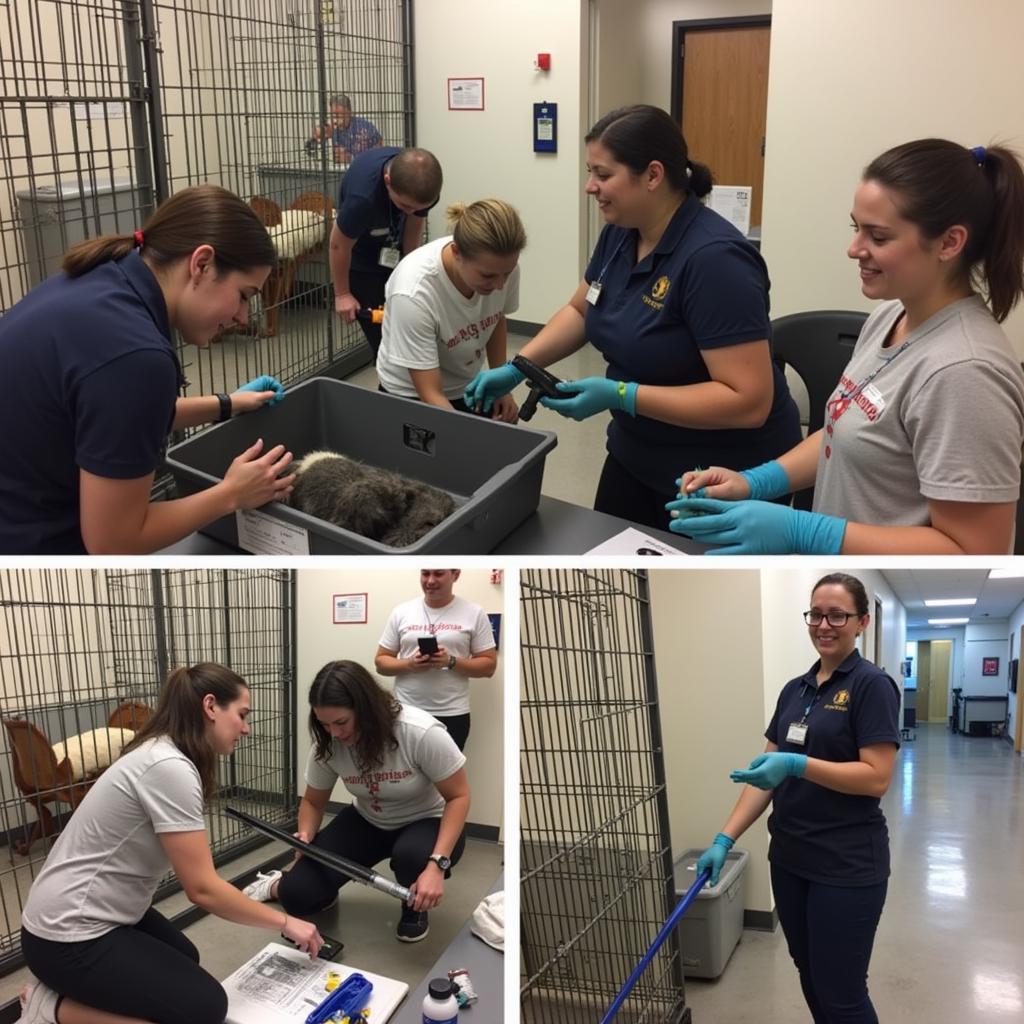Does The Humane Society Euthanize animals? This is a complex question with a nuanced answer, and one that weighs heavily on the minds of many animal lovers. Understanding the role of humane societies and the difficult choices they face requires compassion, empathy, and a commitment to finding the best solutions for animals in need. This article aims to explore the realities of euthanasia in animal shelters, including the humane society, and discuss the factors contributing to this challenging issue.
Euthanasia in Humane Societies: A Difficult Reality
It’s important to first understand that “humane society” is a broad term, often referring to independent, non-profit organizations dedicated to animal welfare. These organizations operate individually and are not governed by a single national body. While some humane societies operate no-kill shelters, the unfortunate reality is that many do perform euthanasia. This decision, though incredibly difficult, is often made due to a complex interplay of factors. The reasons for euthanasia can range from overcrowding and limited resources to addressing untreatable medical conditions and behavioral issues that pose a risk to public safety. The goal is always to provide the most humane outcome for each animal in their care. Let’s delve deeper into the specific circumstances.
You might be interested in learning more about the Harlingen Humane Society Clinic.
Why Do Some Humane Societies Euthanize?
Several factors contribute to the difficult decision to euthanize animals. Overpopulation is a major challenge, particularly in areas with high stray populations and limited responsible pet ownership practices. Shelters often have limited space and resources to care for every animal that comes through their doors.
Another factor is the health of the animals. Some animals arrive at shelters with severe injuries or illnesses that are too costly or difficult to treat. In these cases, euthanasia may be the most humane option to prevent further suffering. Similarly, animals with behavioral issues that make them unsafe for adoption, such as aggression, may be euthanized, particularly if behavioral modification programs are unavailable or unsuccessful.
 Humane Society Overcrowding
Humane Society Overcrowding
Exploring Alternatives to Euthanasia
Many humane societies and animal welfare organizations are actively working to reduce euthanasia rates. These efforts focus on promoting responsible pet ownership, increasing adoption rates, and implementing programs like Trap-Neuter-Return (TNR) for feral cat populations. No-kill shelters are becoming increasingly common, prioritizing finding homes for every adoptable animal, but these shelters often face capacity challenges and may have waiting lists for intake.
Learn more about the different services provided by the Humane Society Silicon Valley Services.
What is a No-Kill Shelter?
No-kill shelters commit to saving all healthy or treatable animals. They typically have limited intake and may require animals to meet certain criteria for acceptance. This can lead to longer waiting times for surrendered pets or stray animals to be accepted. However, they exemplify a commitment to finding homes for animals even with challenging circumstances. These shelters often rely heavily on foster homes and community support to achieve their no-kill mission.
How Can I Help Reduce Euthanasia Rates?
There are several ways individuals can contribute to reducing euthanasia rates. Adopting from a shelter or rescue organization is one of the most impactful actions. Spaying or neutering your pets helps prevent unwanted litters, addressing the root cause of overpopulation. Supporting local shelters through volunteering, donating, or fostering animals can also make a significant difference. Furthermore, advocating for responsible pet ownership in your community and educating others about the importance of adoption can create lasting change.
“Supporting your local animal shelter, whether through volunteering or donations, can make a real difference in the lives of animals in need,” says Dr. Emily Carter, DVM, a leading advocate for animal welfare.
“Adopting a pet is a rewarding experience and a powerful way to save a life,” adds Sarah Johnson, an experienced animal rescuer and foster parent.
You can find more information on our website specifically addressing “does humane society euthanize“.
Conclusion: Working Towards a More Humane Future
Does the humane society euthanize? The answer, sadly, is often yes, but it’s a complex issue with no easy solutions. While euthanasia remains a challenging reality for many shelters, understanding the contributing factors and supporting efforts to reduce euthanasia rates are crucial steps towards a more humane future for all animals. By working together, we can create a world where every animal has a safe, loving home. Consider visiting the Boyle Humane Society or checking out the Humane Society Sauk County for more local information and resources.
 Volunteering at Animal Shelter
Volunteering at Animal Shelter
FAQ
- What is the difference between a humane society and an animal shelter?
- How can I find out if my local humane society euthanizes?
- What should I consider before adopting a pet from a shelter?
- What are some ways to help control the pet population in my community?
- What is the process for surrendering a pet to a humane society?
- What happens to animals that are not adopted from shelters?
- How can I support my local humane society or animal shelter?
Scenarios
Scenario 1: An owner surrenders their beloved senior dog due to financial constraints and the inability to afford necessary veterinary care. The dog has a severe, untreatable illness causing significant pain.
Scenario 2: A stray dog with a history of aggression towards other animals and people is brought into the shelter. Behavioral modification proves unsuccessful.
Scenario 3: A healthy, friendly kitten is brought into an already overcrowded shelter with limited space and resources.
Further Exploration
For further reading, you may be interested in articles about animal welfare, responsible pet ownership, and the no-kill movement.
Please feel free to contact us for support. Call us at 02043854663, email us at [email protected], or visit our office at Zone 34, Bac Giang, 260000, Vietnam. We have a 24/7 customer service team ready to assist you.